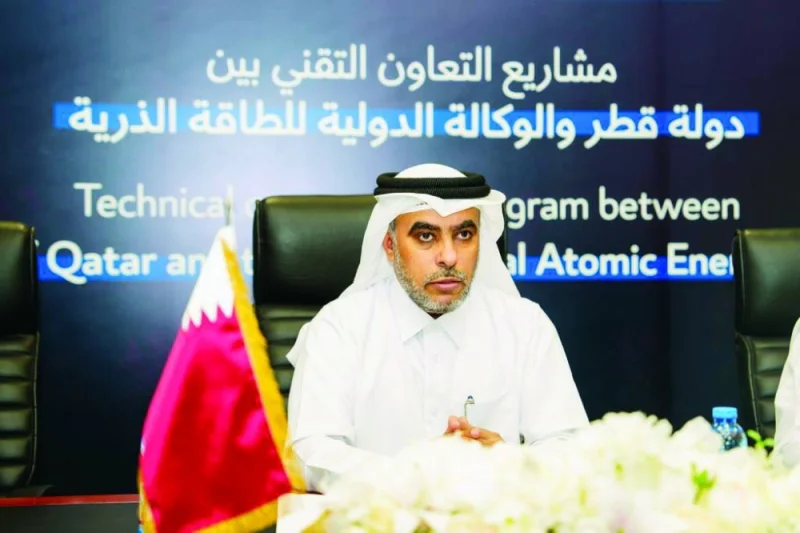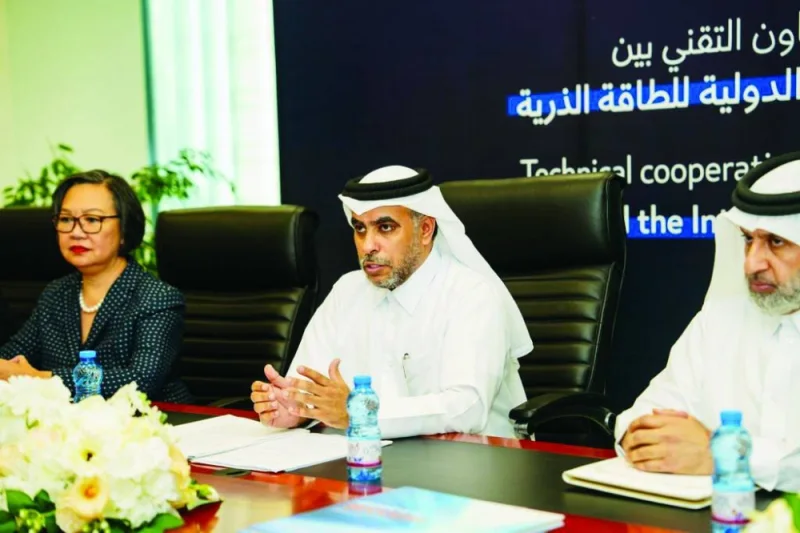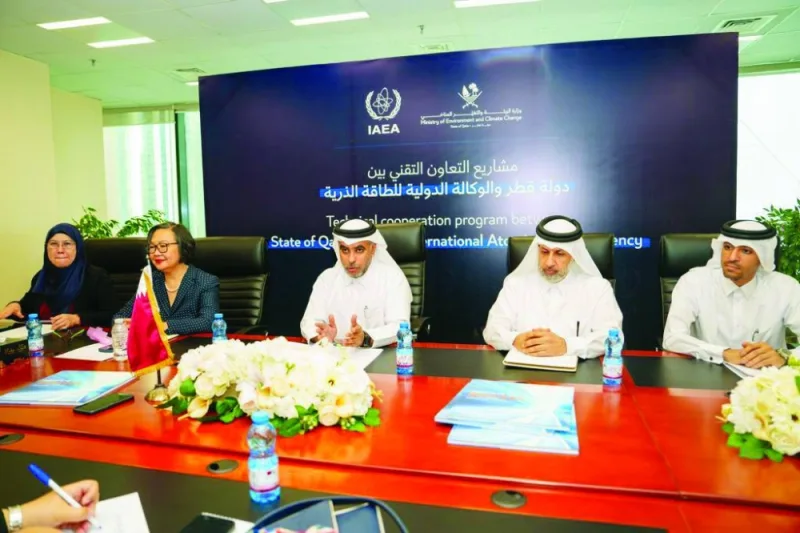

The Radiation Control Department at MECC follows up the implementation of all national projects together with the relevant national authorities to ensure the constant and effective implementation of projects, in line with the Qatar National Vision 2030, as well as the framework program approved and signed with AIEA.


The official visits by high-level IAEA delegations praised Qatar's great development in the fields of radiation medicine and food safety.
The International Agency for Atomic Energy (IAEA) has approved three new national projects for Qatar, to be implemented starting January and lasting for three years. The first project related to the Management of Naturally Occurring Radioactive Material (NORM) wastes and Residues, which result from oil and gas extraction. The two other projects fall under medical-technical co-operation, the first related to cancer diagnosis, particularly in children, whereas the second is concerned with combating certain animal diseases.
In an interview with the media, Assistant Undersecretary for Environmental Affairs at the Ministry of Environment and Climate Change (MECC) and Qatar's National Liaison Officer for Technical Cooperation Programmes at IAEA Abdulhadi Nasser al-Marri explained that the ministry's Radiation Control Department is currently updating the rules and regulations for managing NORM resulting from the oil industry, which were issued back in 2013, in order to ensure employee safety from exposure to radiation emanating from NORM, as well as protecting the environment against pollution caused by radioactive waste, in line with international safety standards.
Al-Marri said that the co-operation between the State of Qatar and IAEA is diverse and is going great, resulting with the launch of seven national projects covering agriculture, food safety from radioactive pollutants, in addition to three projects in the field of treatment and diagnosis using radiological techniques, as well as two projects in radiation protection and safety of radiation sources, implemented by the Radiation Control Department at MECC.
He said that these projects include: developing best practices using nuclear techniques in soil, nutrients, water and plants to increase feed production, strengthening national capabilities in the field of food safety to test and monitor waste "pollutants" using nuclear techniques, enhancing knowledge and applying dosimetry in the field of diagnostic radiology, and establishing services.
Measuring internal doses, establishing a secondary laboratory to calibrate radiation measuring devices, and strengthening the regulatory infrastructure for effective control over medical, industrial and environmental monitoring, pointing out that the State of Qatar is currently participating in 14 regional projects in the fields of agriculture and education, 4 projects in the health sector, and 7 radiation safety projects. Environmental, and another livestock project.
Abdulhadi Nasser al-Marri pointed out that the State of Qatar has issued a set of guidelines for entities working with radiation control for the purpose of ensuring radiation protection and safety of radiation sources, in line with international safety standards issued by IAEA. Additionally, the state set licensing requirements for radiation protection service providers, for example testing for radioactive leakage and/or contamination, and radiological device maintenance.
Al-Marri added that he discussed with IAEA officials currently visiting Doha a number of IAEA initiatives launched recently, and the ways the State of Qatar could benefit from them. Among them are the Rays of Hope initiative, which aims to increase access to treatment using radiation medicine for cancer and other diseases, the NUclear TEChnology for Controlling Plastic Pollution (NUTEC Plastics), the Atoms4Food initiative, and the Zoonotic Disease Integrated Action (ZODIAC) initiative.
Abdul Hadi bin Nasser al-Marri reviewed the national projects undertaken by the State of Qatar in co-operation with AIEA, which come within the framework of the peaceful use of nuclear energy, serving sustainable development priorities, and obtaining technology used in peaceful and scientific sectors, such as environmental, health, agricultural, and educational sectors, highlighting the achievements of MECC in the peaceful uses of nuclear energy, and its partnership with AIEA.
Al-Marri explained that, through its function as a national liaison office with AIEA, the Radiation Control Department at MECC follows up the implementation of all national projects together with the relevant national authorities and in co-operation with AIEA, to ensure the constant and effective implementation of projects, in line with the State of Qatar's development priorities in accordance with the Qatar National Vision 2030, as well as the framework program approved and signed with AIEA.
He added that discussions were held on a number of technical areas within the government's National Development Strategy, revolving around maintaining economic prosperity through human capital development, protecting the environment for future generations, in addition to promoting a comprehensive approach to health and social development.
For her part, Director of the Division for Asia and the Pacific in the Department of Technical Cooperation at AIEA Jane Abaya praised Qatari laboratories' advanced and vast capabilities, making them rehabilitation and educational centers for AIEA member states, to train their personal on nuclear medicine devices and radiation therapy for cancer patients, as well as providing training on Food safety laboratory devices and addressing the risks of food contaminants, supporting countries in capacity building to ensure the safety of food exports and imports.
Abaya highly appreciated the Radiation Control Department's projects that include radiation safety, monitoring all radiological activities in Qatar, whether medical, industrial, research, etc., in addition to ensuring the effective implementation of Decree Law No. 31 of 2002 on Radiation Protection, and the regulations issued thereunder to regulate radiation activities and practices in Qatar.
The Director of the Division for Asia and the Pacific in the Department of Technical Cooperation at AIEA pointed to the great co-operation between the State of Qatar and the Agency, their numerous joint projects, and the official visits by high-level IAEA delegations to the State of Qatar, who praised Qatar's great development in various fields, especially in radiation medicine and food safety.
She noted that she together with a group of AIEA experts held several meetings with national institutions, including: Qatar Foundation, the Ministry of Education and Higher Education, and Hamad Medical Corp, discussing the assistance in nuclear science that AIEA will provide in to high school and university students, in addition to covering Qatars participation in Nuclear Science Olympiad for U-20 students next year, among other topics.
Abaya stated that AIEA is currently cooperating with Qatar in studying environmental issues, including plastic pollution in the sea, one of the biggest challenges facing the world currently, especially given the studies that expect that there will be more plastic than fish in the seas in 2050, if this challenge is not solved through recycling and employing modern technologies to destroy pollutants. Moreover, she stressed the need to raise awareness about the peaceful use of nuclear energy in public schools, as well as creating buffers for nuclear and radiation accidents, and training human personnel to handle such accidents in Qatar and abroad.
